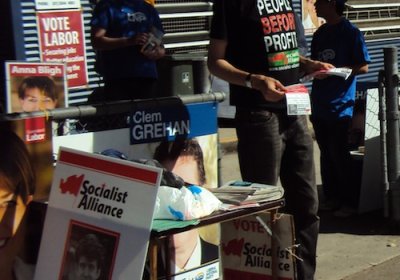The death of 21-year-old Brazilian student Roberto Laudisio Curti in a central Sydney street, after six police tasered him at least three times, has highlighted the rising use of Tasers by police and security in Australia and worldwide.
The deadly confrontation with Curti on March 18 has now been revealed as a case of “mistaken identity” over the theft of a packet of biscuits. Curti was also capsicum sprayed, and was running from police when he was tasered multiple times in the back.
Australia
Poultry industry union delegates in the National Union of Workers (NUW) and supporters met on March 27 to launch a report outlining the basis for the union’s “Better Jobs 4 Better Chicken” campaign.
Late last year, NUW members at Baiada Poultry took strike action over conditions of employment and wages, citing widespread use of cash-in-hand work at rates well below the minimum wage.
Global opposition to unconventional gas mining is growing fast. Impacts on water, food, health and the environment, associated seismic risks and climate change contribution are just some of the many reasons.
Meanwhile, the industry is growing. Its potential growth in Australia is enormous, with large known reserves and billions to be made.
The Cocos (Keeling) Islands is a tiny group of coral atolls in the Indian Ocean 2800 kilometres north-west of Perth and 900 kilometres from Java. It has a population of about 600.
These islands were nominally a British territory between 1858 and 1955, when they were transferred by a British act of parliament to Australia. Yet for the next 17 years, the Australian government allowed the islands to operate as a private fiefdom of the Clunies-Ross family — just as the British had for 100 years before then.
On the afternoon of March 30, Friends of the Earth campaigner Cam Walker said on Twitter: “This has been the week from hell for climate change politics in Vic. There's still a few working hours, maybe a nuke power plant is next?”
Climate targets, standards abandoned
A movement for Aboriginal sovereignty has galvanised around the February 12 formation of the Nyoongar Tent Embassy in Perth.
The embassy was directly inspired by two developments: the 40th anniversary of the Aboriginal Tent Embassy in Canberra, which promoted a national push for Aboriginal sovereignty, and the February 8 report about negotiations between the state government and the South West Aboriginal Land and Sea Council (SWALSC) about Nyoongar native title.
The NSW Coalition government is pushing ahead with plans to relocate Gosford Public School and sell the school site to commercial developers. The site has waterfront views and is considered prime real estate.
The decision comes despite a 10,000 strong petition against the plan collected by the Gosford community. Parents, teachers, students and supporters held a protest outside NSW parliament on March 29 while the petition was being read inside.
Green Left Weekly's Susan Austin spoke to forest activist Miranda Gibson, who has lived for more than 100 days on a platform 60 metres up a Tasmanian old-growth tree. The “Observer Tree” has brought international attention to the campaign to protect Tasmania's forests. Gibson has vowed to continue her tree-sit until the campaign wins.
* * *
What prompted you to climb the tree and take this courageous action? What do you hope to achieve?
The campaign to protect Western Australia's Kimberley region from gas extraction will be the topic of an April 19 meeting in Sydney.
WA Greens Senator Rachel Siewert, The Wilderness Society national director Lyndon Schneiders and Beyond Zero Emissions' Geoff Cameron will address the public forum, Saving the Kimberley: Our Land or Gasland?
About 200 people attended a meeting on Sri Lanka organised by People for Human Rights and Equality, a group of people of Sri Lankan origin now living in Australia.
The meeting was addressed by Basil Fernando, a director of the Asian Human Rights Commission, and Britto Fernando, co-convener of the Platform For Freedom, a coalition of groups in Sri Lanka campaigning for freedom of expression and the right to live.
The Socialist Alliance (SA) pushed ahead with its campaign to put socialist politics before the Queensland electorate, as the ALP government faced annihilation in the state election held on March 24. Although everyone knew the government was unpopular, the sheer size of the Liberal National Party (LNP) win took all commentators by surprise.
The election result has left Labor with only seven or eight seats compared with the LNP’s probable 78. The Bligh ALP government suffered a record two-party swing away of 15%.
The Australian Labor Party (ALP) in Queensland is in its deepest crisis in its 120-year history following the disastrous defeat in the state elections on March 24. A swing of more than 15% to the Liberal-National Party (LNP) has resulted in the Queensland ALP's record lowest primary vote of 26.5%.
Labor is likely to win seven, or at most eight, seats in Queensland’s parliament of 89. The LNP will take 77 or 78. This is a worse position for the ALP than the Joh Bjelke-Petersen regime's high point in 1974, when Queensland Labor was reduced to 11 seats.
- Previous page
- Page 754
- Next page










